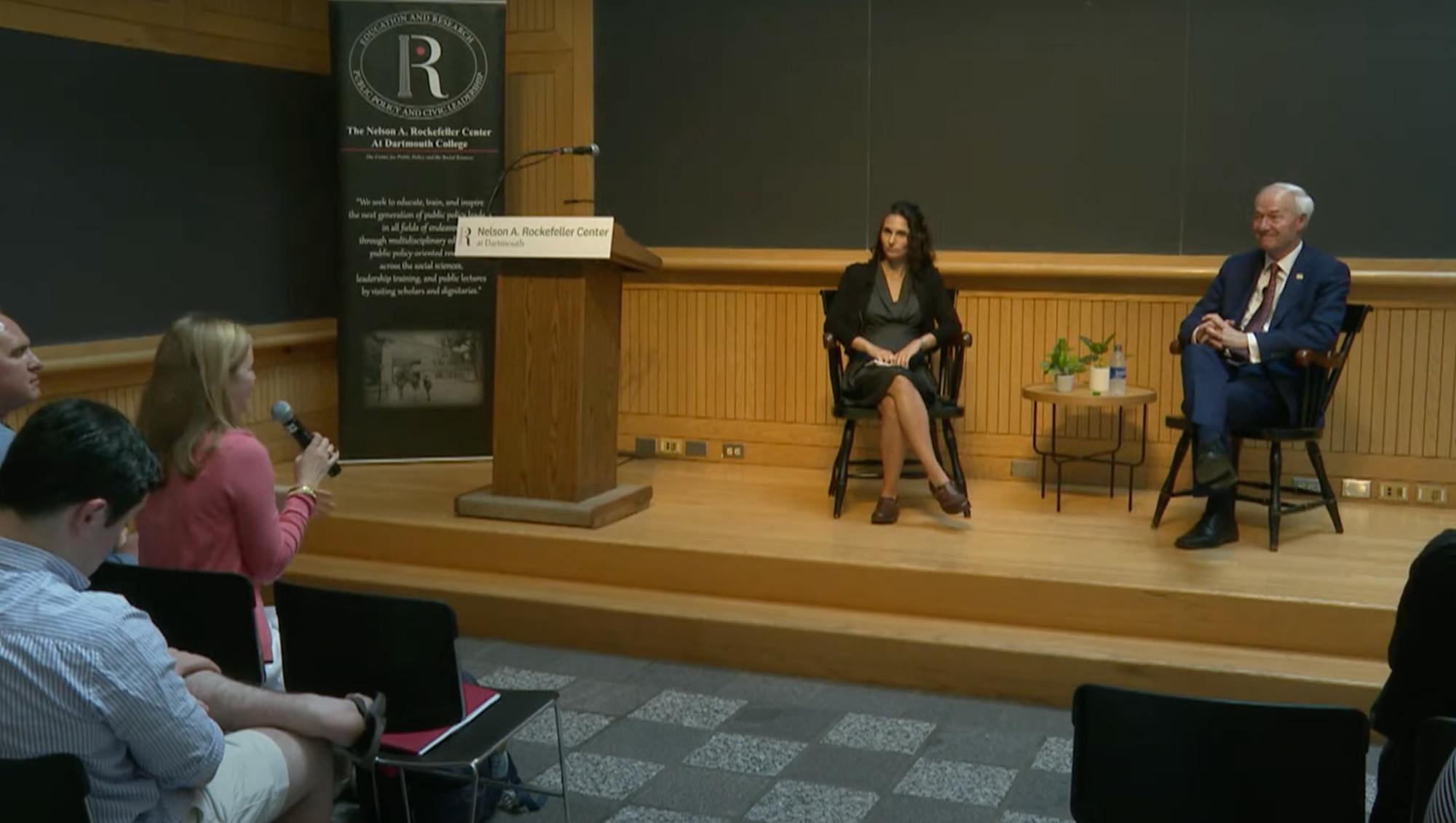On Aug. 8, former Arkansas governor Asa Hutchinson visited the College during his presidential campaign, as he seeks 40,000 individual donors to qualify for the Republican debate stage. In a lecture and Q&A with Dartmouth students and Upper Valley residents, Hutchinson emphasized the rule of law and overcoming partisan division in America.
During the discussion, which was moderated by government professor Mia Costa, Hutchinson pointed to former President Donald Trump’s indictment on Aug. 1 and said there is a “real need” for non-Trump candidates in the running. According to the New York Times and a Siena College Poll, Trump is polling at 54% for the Republican presidential nomination.
“We need to showcase that there is an alternative [to Trump],” Hutchinson said. “Once that realization sets in, I’m confident those numbers are going to decline on Donald Trump and [give] somebody else a chance to rise and be competitive.”
Hutchinson described the state of the country as divisive “chaos,” adding that Trump’s reelection would “supercharge the chaos.”
“That’s not what we need in our country,” he said.
Hutchinson began his public service career in 1982 as a U.S. attorney for the Western District of Arkansas, before being elected in 1996 to the House of Representatives, where he has served for three terms, according to his campaign website. Hutchinson’s second term as Arkansas’s governor ended on Jan. 10, 2023.
Pointing to his political background, Hutchinson said he could be the leader the country needs to return to “normal” again, describing his platform for president as “traditionally conservative.”
“The biggest issue facing the country is the economy and ‘balancing the budget,’” Hutchinson said. The former governor promised to “reel in government spending” as president, pointing to his time as governor.
“Unlike Congress, we balanced the budget during my time as governor,” he said.
Hutchinson also focused on strengthening the rule of law. Citing his experience as the youngest U.S. attorney for the Western District of Arkansas, Hutchinson said that “everyone should respect the justice system.”
Many event attendees said they were skeptical of Hutchinson’s platform because of his general focus on the economy and the rule of law. Aidan Pretti ’25, for example, said he wanted to see a more serious discussion about Hutchsinson’s specific policy points.
“As a presidential candidate for the country, I would like to see a little more broad exploration of what his views on the economy and environment are,” Pretti said. “I noticed he brushed over those issues and there weren’t a lot of real specifics, which is what I came here to hear.”
Long-time Hanover resident Monte Burnstein said he values “honesty” and a “sense of responsibility” when evaluating Hutchinson’s platform.
“[The president has to] take care of our safety, our economy — those are their two main jobs,” Burnstein said. “When they start getting into minutiae, that’s when you lose me. They shouldn’t stick their noses in areas they shouldn't be.”
In an interview with The Dartmouth, Hutchinson said that environmental policy and addressing the warming climate starts with the individual household.
“Are we recycling?” Hutchinson asked. “Are we taking the steps individually that help protect our environment? It’s about having the most environmentally sensitive production of energy. We just have to work out the right timeline as we implement these new initiatives to protect our environment.”
Hutchinson said he was “nervous” about “strict and artificial timelines” of environmental policy but did not elaborate on other specifics.
In 2021, Hutchinson signed an almost total ban on abortion without exceptions for rape or incest as governor of Arkansas. However, during the Q&A and interview with The Dartmouth, he voiced his support for implementing such exceptions.
“You have to start with realizing how difficult a problem pregnancy can be,” Hutchinson said. “You need to provide solutions and the best kind of maternal care and adoption services … I also believe reasonable exceptions should be a part of any legislation that addresses abortion issues such as the life of the mother, rape and incest.”
Hutchinson served as the Drug Enforcement Administration administrator and Homeland Security for border and transportation security undersecretary in the early 2000s, according to Hutchinson’s campaign website. He said that both these experiences would influence his immigration policies as president.
“The most fundamental principle is that immigrants are the heartbeat of America,” Hutchinson said. “We have to have an immigration policy that respects our legal process and we’ve got to protect our southern border.”
As Homeland Security undersecretary from 2003 to 2005, Hutchinson enforced E-Verify, a system that confirms U.S. work authorization by comparing employment forms to the documents the U.S. Department of Homeland Security and Social Security Administration can access. Hutchinson said he wants to implement a more “comprehensive” E-Verify program as president without extra cost to small businesses.
“We need to go after the cartels in Mexico that are controlling the Southern border and causing the human suffering that we see,” Hutchinson said.
According to the Republican National Committee, candidates need “a minimum of 40,000 unique donors …with at least 200 unique donors per state or territory in 20 plus states and/or territories.” Hutchinson has reached the halfway point with unique donors and urged the audience at the Rockefeller Center to donate and volunteer for his campaign.
Still, many students in the room said they are not hopeful about the candidate choices they will have in the upcoming primary elections. Decker Jackson ’25 said he is “extremely dissatisfied” with many of the front-running candidates.
“I feel the majority of people are tired of having to choose the lesser of two evils,” Jackson said.
Ultimately, Hutchinson said he sees his responsibility as president to “bring out the best of America.” He emphasized instilling “young people’s” confidence in democratic institutions through policy, adding that he plans to “reduce the interest rate on student loans” — which he said he believes “helps students and gives them hope.”




